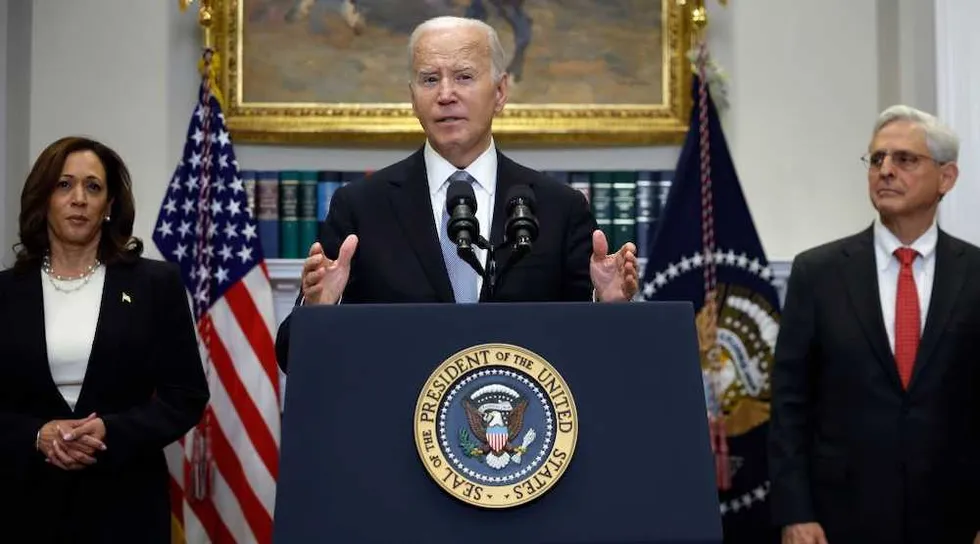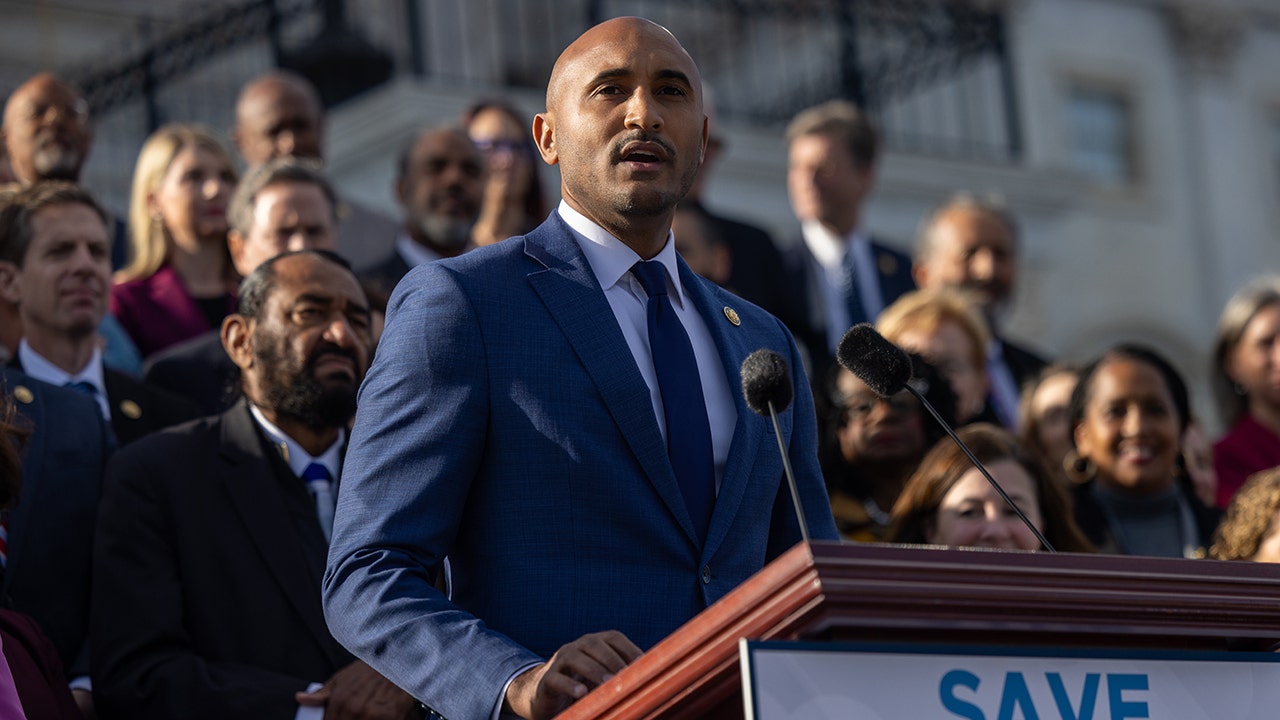The FBI’s Arctic Frost investigation is confirmation that the left sees conservatives as enemies of the state and is fully intent on treating them as such.
Arctic Frost began in April 2022, with the approval of Joe Biden’s attorney general, Merrick Garland, along with Deputy Attorney General Lisa Monaco and FBI Director Christopher Wray. In November 2022, newly appointed special counsel Jack Smith took over the probe. Smith declared he was focused on the allegations of mishandling classified documents, but Arctic Frost shows he was much more ambitious. He helped turn the investigation into an effort to convict Donald Trump and cripple the Republican Party.
The report indicts Smith for failing at lawfare, not for the lawfare itself.
It was revealed last month that by mid-2023, the FBI had tracked the phone calls of at least a dozen Republican senators. Worse still, with the imprimatur of Justices Beryl Howell and James Boasberg of the U.S. District Court for the District of Columbia, Smith issued 197 subpoenas targeting the communications and financial records of nine members of Congress and at least 430 Republican entities and individuals.
The organizations targeted were a “Who’s Who” of the American right, including Turning Point USA, the Republican Attorneys General Association, the Conservative Partnership Institute, and the Center for Renewing America.
Not content with active politicians, these subpoenas also went after advisers, consulting firms, and nonprofits. One subpoena targeted communications with media companies, including CBS, Fox News, and Newsmax. Normally, a telecommunications company should inform its clients and customers about subpoenas. But Howell and Boasberg also ordered nondisclosure orders on the dubious grounds that standard transparency might result in “the destruction of or tampering of evidence” — as if a U.S. senator could wipe his phone records or a 501(c)(3) could erase evidence of its bank accounts.
The scale and secrecy of Arctic Frost are staggering. It was a massive fishing expedition, hunting for any evidence of impropriety from surveilled conservatives that might be grounds for criminal charges. One can see the strategy, typical among zealous prosecutors: the threat of criminal charges might compel a lower- or mid-level figure to turn government witness rather than resist.
But Smith had an even grander plan. By collecting financial records, he was trying to establish financial ties between those subpoenaed and Trump. Had Smith secured a conviction against Trump, he could then have pivoted to prosecuting hundreds of individuals and entities under the Racketeer Influenced and Corrupt Organizations Act. This would have led to asset freezes, seizures, and further investigations.
Smith laid out a road map for crushing conservative organizations that was supposed to be implemented throughout a prospective Biden second term or a Harris presidency.
Fortunately, voters foiled Smith’s efforts.
A false equivalence
The meager coverage of Arctic Frost thus far has compared the scandal to the revelations of Watergate. But the comparison doesn’t hold. Arctic Frost involved significantly more surveillance and more direct targeting of political enemies than the Senate Watergate hearings of 1973 and 1974 managed to expose.
Setting aside campaign finance matters and political pranks, the most serious crimes the hearings exposed pertained to the Nixon administration’s involvement with break-ins and domestic wiretapping.
In the summer of 1971, the White House formed a unit to investigate leaks. Called the “Plumbers,” this unit broke into the offices of Dr. Lewis Fielding, who was the psychiatrist of Daniel Ellsberg, the man who leaked the Pentagon Papers. Transferred over to the Committee to Re-elect the President at the end of the year, the unit then broke into the Democratic National Committee’s offices in the Watergate complex. The hearings exposed the burglars’ connection to CRP — and to the White House.
RELATED: Trump’s pardons expose the left’s vast lawfare machine
Photo by MANDEL NGAN/AFP via Getty Images
The administration also authorized warrantless wiretaps. From May 1969 until February 1971, in response to the disclosures of the secret bombing of Cambodia, the FBI ran a 21-month wiretap program to catch the leakers. This investigation eventually covered 13 government officials and four journalists. FBI Director J. Edgar Hoover submitted the wiretapping authorizations, and Attorney General John Mitchell signed them.
As a matter of optics, it was the surveillance of the members of the media that provoked the scandal. Since they were critical of the Nixon administration, it looked like the administration was targeting its political enemies. As a criminal matter, the issues were less about the actions themselves, as it was at least arguable that they were legal on national security grounds. Instead, it was more about the cover-up. When these wiretaps came up in the hearings, Mitchell and others deceived investigators, opening themselves up to charges of obstruction of justice.
A troubling parallel
One aspect revealed during the Watergate hearings could be compared to Arctic Frost. The hearings exposed extensive domestic spying that preceded the Nixon administration. The tip of the iceberg was the proposed Huston Plan of June 1970, which became one of the most sensational pieces of evidence against the Nixon administration. Named for the White House assistant who drafted it, the Huston Plan proposed formalizing intelligence coordination and authorizing warrantless surveillance and break-ins.
Nixon implemented the plan but rescinded it only five days later on the advice of Hoover and Mitchell.
Who were those Americans who might have had their civil liberties affected? It was the radical left, then in the process of stoking urban riots, inciting violence, and blowing up government buildings. The plan was an attempt to formalize ongoing practices; it was not a novel proposal. After Nixon resigned, the Senate concluded in 1976 that “the Huston plan, as we now know, must be viewed as but one episode in a continuous effort by the intelligence agencies to secure the sanction of higher authority for expanded surveillance at home and abroad.”
For years, ignoring the statutes that prohibited domestic spying, the CIA surveilled over three dozen radicals. The military and the Secret Service kept dossiers on many more. The FBI operated COINTELPRO, its surveillance of and plan to infiltrate the radical left, without Mitchell’s knowledge. And as the Senate discovered, “even though the President revoked his approval of the Huston plan, the intelligence agencies paid no heed to the revocation.” This was all excessive, to say the least.
RELATED: Damning new docs reveal who’s on Biden admin’s ‘enemies list,’ expose extent of FBI’s Arctic Frost

Watergate helped expose a far larger and longer surveillance operation against left-wing domestic terrorists. Comparing this to Arctic Frost suggests that the shoe is now on the other foot: the state regards right-wing groups as equivalent to domestic terrorists. Once, the national security state was abused to attack the left. Now, it’s abused to attack the right. This is hardly an encouraging comparison.
Lawfare for thee, not for me
There’s a third reason that the comparison to Watergate doesn’t hold. In the 1970s, abuses generated a reaction. The Huston Plan, for instance, was squashed by the head of the Department of Justice. Controversial surveillance plans wound down eventually. Wrongdoing was exposed, and the public was horrified, worsening the people’s growing mistrust of government. Lawmakers passed serious reforms to rein in intelligence agencies and defend Americans’ civil liberties.
Survey today’s landscape, and it doesn’t look like there will be any similar reaction. If you’re a conservative staffer, activist, contract worker, affiliate, donor, politician, or lawmaker, you’ve learned about the unabashed weaponization of the federal justice system against you without the presence of any crime. What’s even more disturbing is that this investigation went on for 32 months, longer than Mitchell’s wiretaps.
During that time, no senior official squashed the investigation, and no whistleblowers leapt to defend conservatives. There wasn’t a “Deep Throat” leaking wrongdoing, as there once was in Deputy Director of the FBI Mark Felt. There weren’t any scrupulous career bureaucrats or political appointees in the Justice Department or elsewhere ready to threaten mass resignations over a legally spurious program, as happened to George W. Bush in the spring of 2004.
No telecommunication company contested the subpoenas, as happened in early 2016 when Apple disputed that it had to help the government unlock the iPhone of one of the terrorists involved in the December 2015 San Bernardino shootings. Neither bureaucrats nor corporations are coming to the rescue of the civil liberties of conservatives.
Public opinion won’t help, either. Senator Eric Schmitt (R-Mo.) has called for “Watergate-style hearings.” But they wouldn’t work. Watergate was a public-relations disaster for the presidency because it spoke to an American public that held its government to a moral standard of impartial activity. Television unified this audience while also stoking righteous fury over the government’s failure to meet that standard.
RELATED: ‘No MAGA left behind’: Trump pardons Giuliani, Powell, others involved in 2020 alternate electors case

The hearings were effective only because they reached a public sensitive to infringements of civil liberties and hostile to the weaponization of the state against domestic targets. But 2025 is not 1975. Even if one could unite the American public to watch the same media event, televised hearings on Arctic Frost wouldn’t bring about a major shift in public opinion. In fact, many voters would likely approve of Arctic Frost’s operations.
For one part of the country, lawfare happens and it’s a good thing. Jack Smith’s lawfare does not embarrass or shame the left. If anything, he is criticized for insufficiently weaponizing the law.
To date, the largest exposé of his methods to reach the legacy media, published in the Washington Post, criticizes Smith for prosecuting Trump’s alleged mishandling of classified documents in Florida (where the alleged crime occurred) rather than in the District of Columbia. It’s an impressive investigative report, assembling aides and experts to showcase Smith’s mistake. Left unstated is the answer to the naïve question: If the offense was committed in Florida, why was it a mistake not to pursue the case in D.C.? Because that was the only district where Smith could guarantee a favorable judge and jury.
To the conservative mind, most Americans still believe that protecting civil liberties matters more than attacking one’s enemies.
The report indicts Smith for failing at lawfare, not for the lawfare itself. In this environment, where lawfare is already taken for granted as the optimal strategy to defeat the enemy, exposing the details of Arctic Frost is like publicizing the Schlieffen Plan’s failure in 1915 and expecting the Germans to be ashamed enough to withdraw. They already know it didn’t work.
Exposing the plan won’t change anything. The election of Jay “Two Bullets” Jones as Virginia’s attorney general is an indication not only of the presence of a fanatic at the head of Virginia’s law enforcement but also of what a good proportion of the Democratic electorate expects from the state’s most vital prosecutor. His task is to bring pain to his enemies.
The 1970s saw the abuses of the national security state generate a forceful public reaction. That turned out to be a rare moment. Instead of a pendulum swing, we have seen a ratchet effect. The national security state has acquired more weapons over the intervening decades, and the resistance to it has grown weaker. This has hit conservatives hardest, because many still imagine that our constitutional culture remains largely intact.
To the conservative mind, most Americans still believe that protecting civil liberties matters more than attacking one’s enemies. From that point of view, American politicians operate under electoral and self-imposed restraints that will impel them to take their opponents’ due process rights seriously or risk being shamed and losing elections. But these restraints are now ineffectual and hardly worth mentioning.
Unlike in the 1970s, there will be no cultural resolution to the problem of lawfare. The problem will only be solved by political means: using power to punish wrongdoers, deter future abuses, and deconstruct the weaponized national security state.
When you’re presumed to be an enemy of the state, the only important question is who will fight back on your behalf.
Editor’s note: A version of this article appeared originally at The American Mind.
Read the full article here






![Random CSPAN Caller Cooks CA Dem Rep Trying to Blame Republicans for Their Shutdown [WATCH] Random CSPAN Caller Cooks CA Dem Rep Trying to Blame Republicans for Their Shutdown [WATCH]](https://www.rvmnews.com/wp-content/uploads/2025/11/2025.11.15-08.28-rvmnews-691839a2efccd.jpg)

![Pay Attention This Week, Congress Is Robbing You With Both Hands: Rep Tim Burchett [WATCH] Pay Attention This Week, Congress Is Robbing You With Both Hands: Rep Tim Burchett [WATCH]](https://www.lifezette.com/wp-content/uploads/2025/12/2025.12.16-12.49-lifezette-6941553d26e92.jpg)


![LAPD Chief Tells Gavin Newsom to Pound Sand [WATCH] LAPD Chief Tells Gavin Newsom to Pound Sand [WATCH]](https://www.lifezette.com/wp-content/uploads/2025/09/2025.09.28-10.37-lifezette-68d90fe4256c7.jpg)
